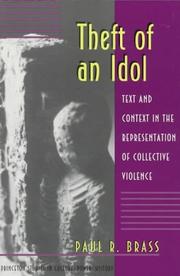| Listing 1 - 2 of 2 |
Sort by
|
Book
ISBN: 9780521193511 9781139205979 1139205978 9781139202985 1139202987 0521193516 9780511894688 9781107557574 110722327X 1139199374 128048425X 9786613579232 113920517X 1139201573 1139204394 0511894686 1107557577 9781139199377 6613579238 9781139201575 9781139204392 Year: 2012 Publisher: New York : Cambridge University Press,
Abstract | Keywords | Export | Availability | Bookmark
 Loading...
Loading...Choose an application
- Reference Manager
- EndNote
- RefWorks (Direct export to RefWorks)
Why do leaders sometimes challenge, rather than accept, the international structures that surround their states? In The International Ambitions of Mao and Nehru, Andrew Kennedy answers this question through in-depth studies of Chinese foreign policy under Mao Zedong and Indian foreign policy under Jawaharlal Nehru. Drawing on international relations theory and psychological research, Kennedy offers a new theoretical explanation for bold leadership in foreign policy, one that stresses the beliefs that leaders develop about the 'national efficacy' of their states. He shows how this approach illuminates several of Mao and Nehru's most important military and diplomatic decisions, drawing on archival evidence and primary source materials from China, India, the United States and the United Kingdom. A rare blend of theoretical innovation and historical scholarship, The International Ambitions of Mao and Nehru is a fascinating portrait of how foreign policy decisions are made.
International relations. Foreign policy --- Mao Zedong --- Nehru, Jawaharlal --- China --- India --- International relations --- World politics --- Coexistence (World politics) --- Peaceful coexistence --- Philosophy. --- Mao, Zedong, --- Nehru, Jawaharlal, --- Mao, Zedong --- Mao Tse-Toung --- Mao Tsetoeng --- Mao Tsetoung --- Mao Tsetung --- Mao, Tse-Toung --- Mao, Tsé toung --- Mao, Tse-Tung --- Mau Tse-Toeng --- Mao, Ze dong --- 毛泽东 --- 毛澤東 --- Javāharalāla Neharū, --- Javāharlāl Nēru, --- Javāhir Lāl Nihrū, --- Jawāhar Lal Nihrū, --- Jawaharlal Nehru, --- Jawāhir-lal Nehru, --- Neharū, Javāharalāla, --- Nehroe, Jawaharlal, --- Neru, Dzavakharlal, --- Neru, Dzhavakharlal, --- Nēru, Javāharlāl, --- Nihrū, Javāhir Lāl, --- Nihrū, Jawāhar Lāl, --- نهرو. جواهر لعل --- نهرو، جواهرلال --- Foreign relations --- Social Sciences --- Political Science

ISBN: 0691026513 0691026505 9780691026510 9780691026503 Year: 1997 Volume: *8 Publisher: Princeton (New Jersey) : Princeton University Press,
Abstract | Keywords | Export | Availability | Bookmark
 Loading...
Loading...Choose an application
- Reference Manager
- EndNote
- RefWorks (Direct export to RefWorks)
As collective violence erupts in many regions throughout the world, we often hear media reports that link the outbreaks to age-old ethnic or religious hostilities, thereby freeing the state, its agents, and its political elites from responsibility. Paul Brass encourages us to look more closely at the issues of violence, ethnicity, and the state by focusing on specific instances of violence in their local contexts and questioning the prevailing interpretations of them. Through five case studies of both rural and urban public violence, including police-public confrontations and Hindu-Muslim riots, Brass shows how, out of many possible interpretations applicable to these incidents, government and the media select those that support existing relations of power in state and society. Adopting different modes - narrator, detective, and social scientist - Brass treats incidents of collective violence arising initially out of common occurrences such as a drunken brawl, the rape of a girl, and the theft of an idol, and demonstrates how some incidents remain localized while others are fit into broader frameworks of meaning, thereby becoming useful for upholders of dominant ideologies. Incessant talk about violence and its implications in these circumstances contributes to its persistence rather than its reduction. Such treatment serves in fact to mask the causes of violence, displace the victims from the center of attention, and divert society's gaze from those responsible for its endemic character. Brass explains how this process ultimately implicates everyone in the perpetuation of systems of violence.
Sociology of minorities --- Political philosophy. Social philosophy --- National movements --- India --- #SBIB:309H518 --- #SBIB:324H73 --- #SBIB:309H504 --- Verbale communicatie: sociologie, antropologie, sociolinguistiek --- Politieke verandering: oppositie en minderheid, protest, politiek geweld --- Code en boodschap: sociologische, antropologische benadering --- Ethnicity --- Case studies --- Ethnic relations --- Politics and government --- Riots --- Violence --- Political aspects --- Case studies. --- Violent behavior --- Social psychology --- Civil disorders --- Assembly, Right of --- History --- Offenses against public safety --- Political violence --- Crowds --- Demonstrations --- Mobs --- Street fighting (Military science) --- Ethnic identity --- Group identity --- Cultural fusion --- Multiculturalism --- Cultural pluralism --- Political aspects&delete& --- Indland --- Ḣindiston Respublikasi --- Republic of India --- Bhārata --- Indii︠a︡ --- Inde --- Indië --- Indien --- Sāthāranarat ʻIndīa --- Yin-tu --- Bharat --- Government of India --- インド --- Indo --- هند --- Индия --- Advani, Lal Kishan. --- Aligarh. --- Arya Samaj. --- Ayodhya. --- Babari Masjid. --- Bajrang Dal. --- Bharatiya Janata Party (BJP). --- Brahmans. --- British rule. --- Chaman Ganj (Kanpur). --- Colonelganj. --- Delhi. --- Deoria district. --- District Magistrate. --- English language. --- First Information Reports (FIRs). --- Gandhi, Indira. --- Hata police station. --- Hindu community. --- Hindu–Muslim relations. --- Indian National Congress. --- Jains. --- Khatikana (Kanpur). --- Lok Dal. --- Nuruddin (pseudonym). --- Parliament. --- Ram. --- army. --- atrocities. --- caste. --- communalism. --- corruption. --- criminals. --- elections. --- faith. --- ideologies. --- law and order. --- methodology. --- pogroms. --- power. --- riots. --- Violence. --- Riots. --- Politics and government. --- Ethnicity. --- Ethnic relations. --- Religija --- Etnični konflikti --- Nasilje --- Inter-ethnic relations --- Interethnic relations --- Relations among ethnic groups --- Acculturation --- Assimilation (Sociology) --- Ethnic groups --- Ethnology --- Social problems --- Sociology --- Minorities --- Race relations --- Political aspects. --- India. --- Indi --- Indii͡ --- Hindu-Muslim relations.
| Listing 1 - 2 of 2 |
Sort by
|

 Search
Search Feedback
Feedback About UniCat
About UniCat  Help
Help News
News